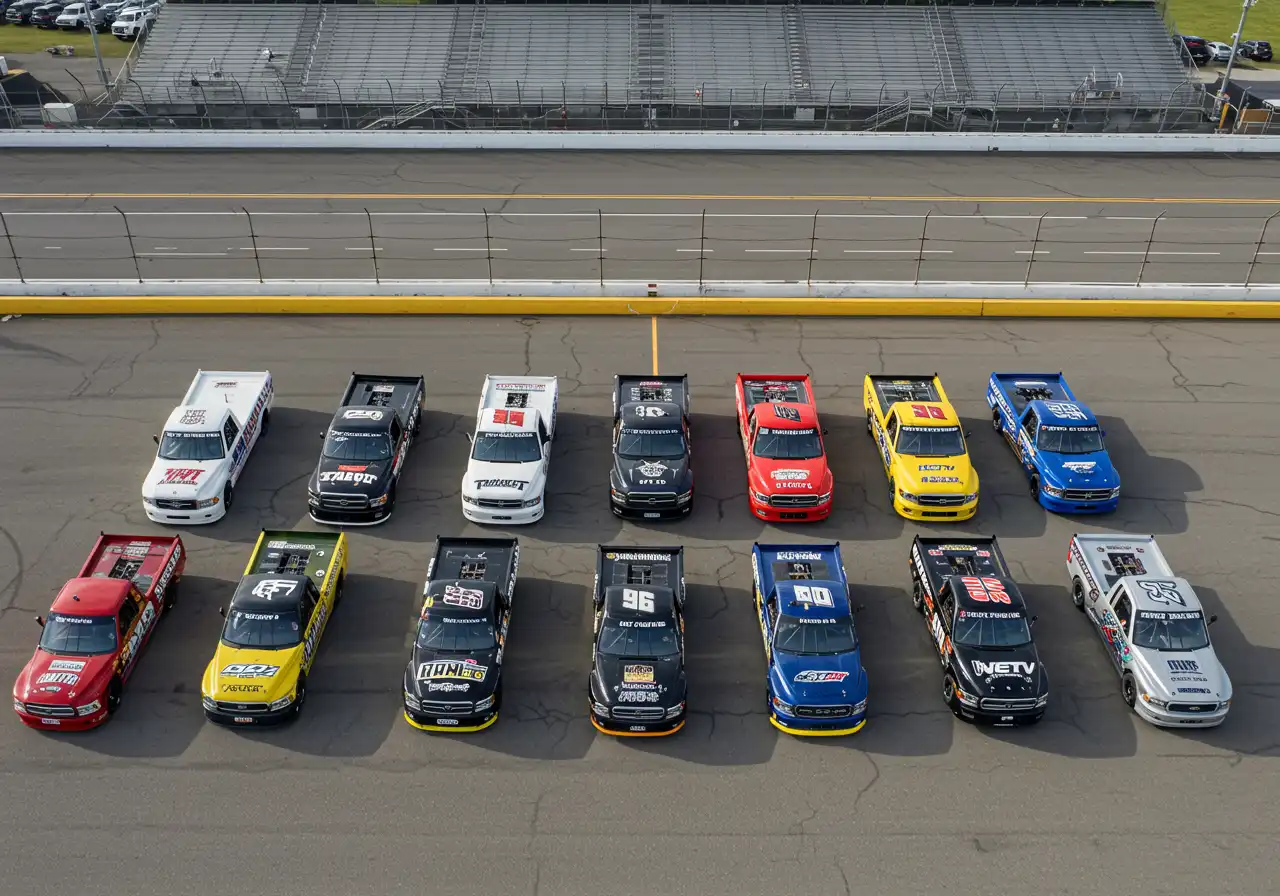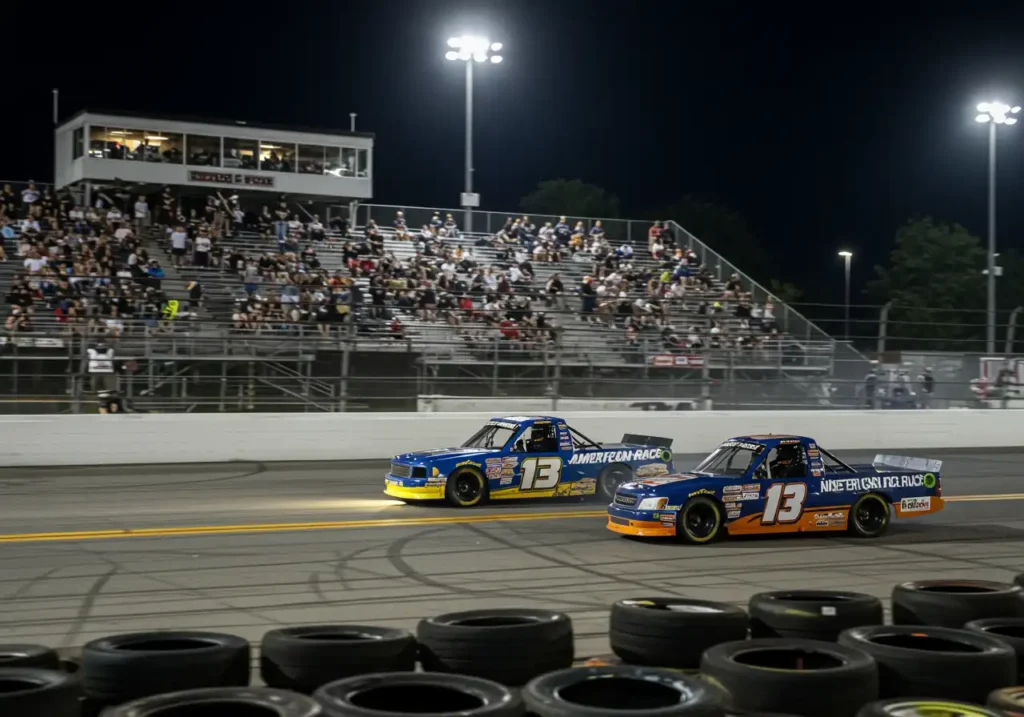Waterford Speedbowl is a 3/8 mile asphalt oval racetrack located in Waterford, Connecticut. It has been an important part of the local racing community since it opened in 1951. The Speedbowl is known for its long history of operation and lively racing culture, hosting many events across different divisions.
Truck racing at Waterford Speedbowl holds a special place in the hearts of local racing enthusiasts. This division has seen significant evolution over the years, becoming a crucial component of the regional racing scene. From its early days to the modern era, truck racing has continually adapted and grown, reflecting broader trends in short-track racing while maintaining its unique charm. The evolution of truck racing at Waterford Speedbowl highlights the dynamic nature of this sport and its enduring appeal to fans and drivers alike.
The Early Years: American Race Trucks (ART)
 Truck racing at Waterford Speedbowl took off in the late 1990s with the introduction of the American Race Trucks (ART) series. This pioneering move marked the beginning of truck racing at the historic track, and it quickly became a significant aspect of the local racing culture.
Truck racing at Waterford Speedbowl took off in the late 1990s with the introduction of the American Race Trucks (ART) series. This pioneering move marked the beginning of truck racing at the historic track, and it quickly became a significant aspect of the local racing culture.
Overview of American Race Trucks Series
- Inception Year: 1997
- Racing Format: Regional touring series
- Participation: Local and regional drivers
- Track Type: 3/8 mile asphalt oval
The ART series provided a new platform for racers looking to transition from other divisions, such as stock car racing, or start their careers in truck racing. It was characterized by its competitive spirit and a format that encouraged both seasoned racers and newcomers to showcase their skills.
Impact on Local Racing Scene
The introduction of ART had a profound impact on the local racing scene:
- Increased Spectator Interest: The novelty of truck racing drew larger crowds, enhancing race day experiences.
- Driver Development: Many local drivers gained valuable experience and exposure, which helped them advance in their racing careers.
- Community Engagement: The series fostered a sense of community among participants and fans, solidifying Waterford Speedbowl’s reputation as a hub for diverse motorsport events.
The early years of ART set a strong foundation for truck racing at Waterford Speedbowl, establishing it as an exciting and integral part of the track’s offerings.
Transition to All-Star Race Trucks (ASRT)
A crucial moment in Waterford Speedbowl’s truck racing history came in 2003 when the series switched from American Race Trucks (ART) to All-Star Race Trucks (ASRT). This change was more than just a name change; it also brought about important changes in how the competition was structured and presented.
Key Aspects of the ASRT Evolution:
- Name Change
The adoption of the All-Star Race Trucks name was more than cosmetic. The new branding aimed to refresh the image of truck racing in New England and appeal to a broader base of racers and fans.
- Racing Format Changes
The ASRT series introduced updated formats:
- Races became more structured, with adjustments to heat races, qualifying procedures, and feature distances.
- Points systems were recalibrated to reward consistency as well as victories, giving mid-pack teams more incentive to participate throughout the season.
- Safety protocols and technical standards received upgrades, bringing the trucks closer in line with national-level short track standards. The importance of these safety protocols cannot be overstated, as they ensure the well-being of drivers and crew members alike. In fact, the role of first responders in maintaining track safety has become an integral part of racing events.
- Rulebook Updates
The transition saw revised technical rules intended to level the playing field:
- Greater emphasis on cost containment helped attract local drivers with limited budgets.
- Standardized tire and engine packages were adopted, reducing disparities between teams.
The ASRT era injected new energy into Waterford’s truck division, leading to tighter competition and renewed interest among both racers and spectators. These changes set a foundation for subsequent evolutions in truck racing at Waterford Speedbowl.
Name Changes and Series Evolution
The evolution of truck racing at Waterford Speedbowl has seen several changes in series names and branding, reflecting wider trends in short track racing. After the American Race Trucks (ART) series ended, the All-Star Race Trucks (ASRT) took over from 2003 to 2008. This transition set the stage for a series of name changes that would follow.
The ABCDL Era (2009-2010)
From 2009, the series operated under the name ABCDL. This period brought a fresh identity to the truck racing division, albeit briefly.
NEATV’s Rebranding Effort (2010-2011)
It was quickly replaced by NEATV in 2010, which signaled another rebranding effort aimed at revitalizing interest and engagement among fans and participants.
Rise of the New England Truck Series (2011-2017)
By 2011, the New England Truck Series (NETS) emerged as a significant player in regional truck racing. NETS maintained a strong presence at Waterford Speedbowl until 2017. The consistency of its events contributed significantly to the local racing scene, drawing numerous drivers and spectators.
Exit Realty Truck Tour’s Continuation (2018-Present)
In 2018, the Exit Realty Truck Tour took over, continuing the tradition of competitive truck racing at Waterford Speedbowl. This iteration focused on maintaining high standards of competition while embracing modern marketing strategies to attract broader audiences.
These shifts in series names and branding reflect an ongoing commitment to keeping truck racing vibrant and relevant. Each transformation brought new opportunities for growth and adaptation within the dynamic world of short track racing.
By 2023, this evolution culminated in the introduction of the Evolve Pro Truck Challenge, representing the latest chapter in Waterford Speedbowl’s storied history of truck racing excellence.
Resurgence at Waterford Speedbowl
Reviving truck racing events at the Waterford Speedbowl brought a renewed sense of excitement to the local racing community. The reintroduction of the New England Truck Series (NETS) in 2011 marked a significant turning point. This revival was not just a return to form but an evolution that blended tradition with new energy.
Key Factors in the Revival:
- Community Engagement: Local drivers and fans welcomed the return of truck racing. The familiar roar of trucks on the track reignited memories and passion for motorsport.
- Schedule Integration: By 2016, the Speedbowl incorporated NETS events into its regular schedule, hosting them alongside other popular divisions like SK Modifieds and Street Stocks.
- Competitive Spirit: The return of truck racing brought back fierce competition, attracting both seasoned racers and new talents eager to prove themselves.
Impact on Waterford Speedbowl:
- Increased Attendance: The revival saw a noticeable boost in spectator numbers, with fans flocking to witness the high-octane action.
- Enhanced Reputation: Hosting NETS events solidified Waterford Speedbowl’s reputation as a premier racing venue in the region.
- Driver Development: The competitive environment provided an excellent platform for drivers to hone their skills and gain exposure.
The resurgence of truck racing through NETS breathed new life into Waterford Speedbowl, ensuring that this beloved motorsport remained a vital part of the local racing scene.
Understanding Truck Racing’s Role at Waterford Speedbowl
Truck racing at Waterford Speedbowl holds a special place in the local racing scene. While divisions like SK Modifieds, Late Models, and Street Stocks each have their own dedicated fans and unique racing styles, the trucks stand out for their combination of power, toughness, and excitement.
What Makes Each Division Unique?
Here’s a breakdown of what sets each division apart:
- SK Modifieds: Known as the main event at Waterford, SK Modifieds feature open-wheel cars with high horsepower and aggressive setups. The competition is fierce, with a history of producing standout drivers and unforgettable finishes.
- Late Models: These full-bodied stock cars prioritize precise handling and strategic racing. Races often showcase close battles and calculated overtakes, rewarding consistency just as much as raw speed.
- Street Stocks: Serving as an entry point for many local racers, Street Stocks use more affordable, production-based vehicles. This class promotes grassroots accessibility and encourages friendly rivalries among drivers.
- Pro Trucks (Truck Racing Division): The trucks fill the gap between pure stock classes and modifieds. Their sturdy chassis allows for tough side-by-side racing, while the sleek bodies ensure competitive speeds.
Fans love the visual difference: trucks have a bulkier shape and demand specific driving skills when turning corners and drafting.
Trucks have established their identity by attracting both up-and-coming talent from other divisions and experienced veterans looking for new challenges.
The Impact of Race Days
Race days featuring all these divisions offer a diverse lineup that appeals to various preferences—trucks consistently deliver some of the most unpredictable results due to their fair rules and varied driver pool. This dynamic fosters an atmosphere where no single division steals the spotlight, but truck races continue to be a major attraction for both participants and fans.
Current Status: Evolve Pro Truck Challenge
The introduction of the Evolve Pro Truck Challenge in 2023 marked a new era for truck racing at Waterford Speedbowl. This series represents the latest chapter in The Evolution of Truck Racing at Waterford Speedbowl, building on a legacy shaped by decades of regional touring divisions and changing formats.
Key features of the Evolve Pro Truck Challenge include:
- Modernized Ruleset: The division operates under updated regulations, focusing on cost control, parity, and driver development. This appeals to both veteran racers and newcomers looking for an accessible entry point into oval track competition.
- Professional Branding: With a fresh identity, the Evolve Pro Truck Challenge emphasizes professionalism—branding, promotion, and social media outreach have all seen significant improvements compared to earlier incarnations.
- Diverse Driver Roster: The series consistently attracts a mix of experienced short-track veterans and emerging local talent. This blend produces competitive fields that keep fans engaged week after week.
- Spotlight Events: Races are strategically scheduled as headline attractions or as part of special event nights, ensuring strong car counts and vibrant grandstands.
The Evolve Pro Truck Challenge has quickly established itself as a cornerstone division at Waterford Speedbowl, maintaining the tradition of hard-fought truck racing while adapting to the expectations of today’s short track community. Drivers and teams now compete for prestige and meaningful championship points under this new banner, with each race adding to the evolving history of trucks at the Speedbowl.
Conclusion
The evolution of truck racing at Waterford Speedbowl shows how the track has adapted and its importance in the larger world of short-track racing. By moving through different series like American Race Trucks, All-Star Race Trucks, and now the Evolve Pro Truck Challenge, Waterford Speedbowl has kept a strong presence in regional motorsports.
This ongoing growth and ability to change demonstrate the constant support from local drivers and fans, making truck racing a vital part of Waterford Speedbowl’s race days.

